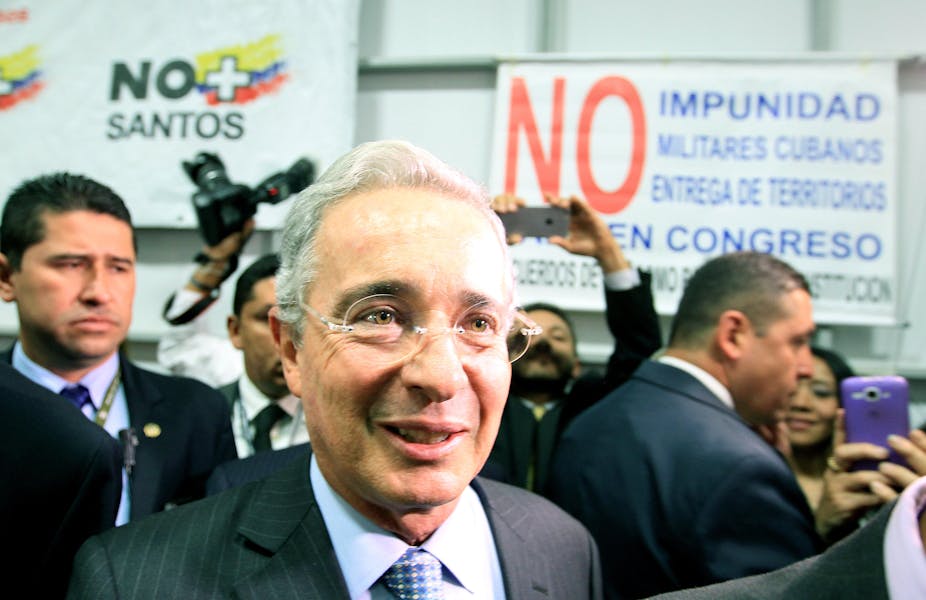A date with destiny is bearing down on the people of Colombia, who will soon vote on whether to accept a historic peace deal struck between the government of President Juan Manuel Santos and the Revolutionary Armed Forces of Colombia (FARC). The agreement will formally end a 52-year war that has claimed an estimated 220,000 lives (most of them civilian), seen thousands kidnapped, and made millions more refugees in their own country.
To help secure peace and start the healing process, various public figures have publicly forgiven FARC insurgents for kidnapping or murdering members of their families. Ángela María Giraldo was among victims invited to attend the Cuba-brokered peace talks in August 2014 in Havana, where she came face to face with the man responsible for the abduction and subsequent killing of 11 Colombian MPs, including her brother Francisco Javier, in 2007.
As she put it in an interview: “It was difficult but I was prepared to put the past behind for the sake of a real prospect of peace.”
Given the war’s terrible cost, a Yes vote in the hope of a lasting peace might sound like a foregone conclusion. But even with the negotiations done, the hard work is far from over.
Much depends on Santos’ predecessor, Álvaro Uribe, who is spearheading the vociferous campaign to veto the agreement. Noted for the hard line he took against the FARC while in office, and for his conviction that the conflict demanded a military solution, Uribe appears far less willing than many of his political colleagues to forgive the FARC for its past crimes – not least the assassination of his own father in Antioquia in June 1983, for which the rebels have repeatedly denied responsibility.
But Uribe’s bitter opposition isn’t just a personal grudge, and his Centro Democrático party is backing his campaign. He and they consider the deal a “surrender” to the FARC, and they’ve been mobilising popular support to block it. Uribe has the backing of several influential political figures, who have vowed to continue with their campaign even if Colombians vote Yes.
No, no, no
Among the main bones of contention for Uribe and his followers is the decision to grant impunity to FARC guerrillas, particularly commanders behind atrocities such as massacres and those responsible for the systematic recruitment of child soldiers.
But the government is at pains to point out that, unlike certain other countries’ historic peace accords, which granted insurgents and militants blanket amnesties, the Colombian agreement draws a clear distinction: guerrillas who confess fully to past crimes may receive reduced sentences or benefit from non-custodial measures, but those who do not will face prison terms of up to 20 years.

A second major sticking point for Uribe and co. is the decision to allow FARC leaders and members to participate in mainstream politics. They are horrified at the prospect of FARC stalwarts – especially the group’s current commander-in-chief Rodrigo Londoño Echeverry, better known as Timochenko – taking elected positions with official, public responsibilities.
But even if they agree in essence with Uribe’s main complaints, more than a few Colombians are suspicious about the true motives behind his opposition. They attribute his repeated attempts to sabotage the process to his well-known rivalry with Santos, who served as his defence minister until 2009, and who succeeded him as president when he was legally blocked from standing for a third term.
Uribe is also thought to be secretly furious at the prospect that Santos could win the Nobel Peace Prize for ending the world’s longest-running conflict. That would overshadow Uribe’s own vital contribution to peace: weakening the FARC militarily to the point that it had little option but to come to the negotiating table.
The October 2 referendum will therefore determine not only Colombia’s future, but also Uribe’s. If the country votes Yes, his political fate will be sealed.
No-one underestimates his influence – not least Santos, who has made a last-ditch effort to get Uribe to publicly endorse the process, or at least keep his opposition private.
While he and many others have advised Uribe to cement his reputation as a statesman by not standing in the way of a Yes vote, his opposition appears too firmly entrenched to waver from his current position. It’s all summed up in his campaign’s rather baffling, counter-intuitive slogan: “Say Yes to Peace by saying No in the Referendum.”

